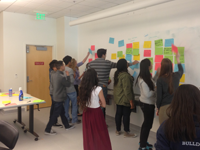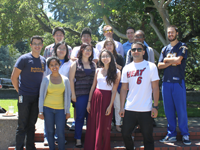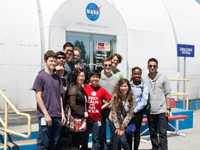Team:Nevada/Human Practices/hp-ambasssadors
From 2013.igem.org
| Line 9: | Line 9: | ||
[[File:nvberkeley.png|left]][[File:nvucsf.png]][[File:nvstanford.png|left]] | [[File:nvberkeley.png|left]][[File:nvucsf.png]][[File:nvstanford.png|left]] | ||
| - | |||
| - | |||
| - | |||
| - | |||
==Consulting with Experts== | ==Consulting with Experts== | ||
Latest revision as of 03:13, 28 September 2013


Our Travels
Many people outside our state picture Nevada as a place for gambling and legalized prostitution. Though gambling (not prostitution) makes up a significant part of our revenue stream, there is so much more that Nevada has to offer. In June, we took a trip to California and to visit with various people in the scientific community and act as intellectual ambassadors for the state of Nevada.
iGEM Networking
We met with the Davis, Berkeley, UCSF, and Stanford-Brown iGEM teams to exchange ideas and information. It was a wonderful chance to learn more about each team's school, lab, and project ideas and get feedback on our own iGEM process. We made lots of friends and look forward to supporting our neighboring teams. It was fun and rewarding experience to meet with our iGEM colleagues outside of competition, and Nevada iGEM looks forward to making time every year to meet even more teams. If anyone wants to visit the University of Nevada, just let us know!

Consulting with Experts
In addition to meeting with other iGEM teams, we visited with faculty contacts to talk about our project. The project we chose involves plant pathology and, unfortunately, there is only one USDA plant pathologist for the State of Nevada. With a project so focused on improving agriculture, we really wanted to accurately represent the perspective of those who know the most about the field by designing a project with their feedback in mind.
As part of our travels, we talked with three faculty members and the chairman from the UC Davis Plant Pathology Department. We also met with Steve Lindow from UC Berkeley, best known for developing “ice minus” strains of bacteria that prevent frost damage in strawberries. Through these interactions, we were provided with very useful feedback and direction for our project. We were able to have a very useful scientific exchange with these faculty members, gathering invaluable information for our project and (hopefully)demonstrating that iGEM students can be enthusiastic about research, much like students from their own institutions.
 "
"

